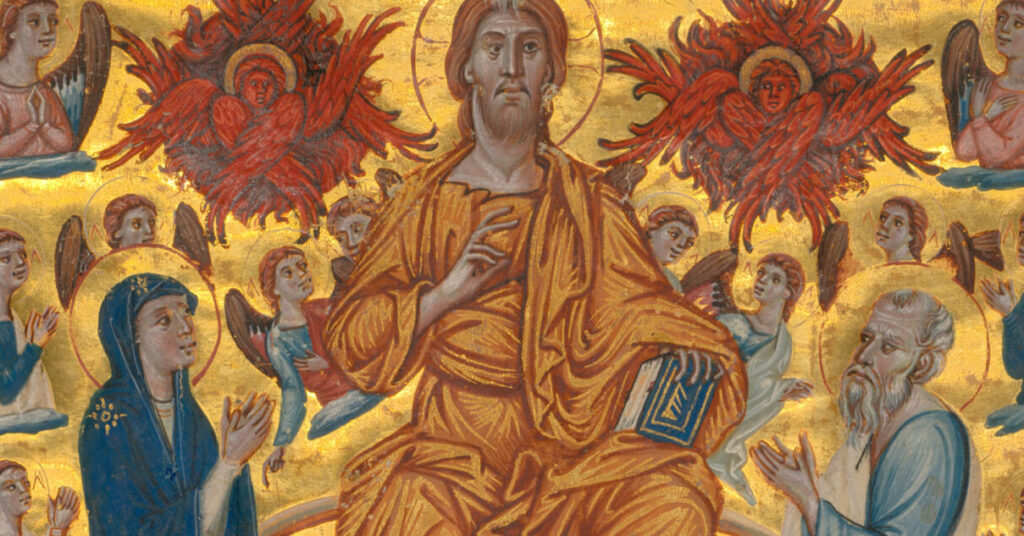By Robert Wurst
The books are opened then to all, A record truly telling What each has done, both great and small, When he on earth was dwelling, And every heart be clearly seen, And all be known as they have been In thoughts and words and actions. (LSB 508, st. 3)
When the Day of Judgment comes, the Lord will gather the living and the dead before Him. On that day, both the prophet Daniel and the evangelist St. John record that books will be opened (see Dan. 7 and Rev. 20). Everyone will be judged according to what they have done. The holy apostle Paul explains, “For we must all appear before the judgment seat of Christ, so that each one may receive what is due for what he has done in the body, whether good or evil” (2 Cor 5:10).
So, what exactly are these books of judgement? Perhaps we picture something akin to Santa’s list of naughty and nice people. Perhaps the book is filled with every misdeed and unseen sin. We may think of it as a Book of Doom! It is a terrifying thought that all our sins and misdeeds are permanently recorded and will be exposed.
That terror is a result of the Law’s condemnation of sinners. The Law of God always accuses us. We know and believe that the Lord sees and knows all we think, speak and do. We know what we have striven to hide and conceal from others. We don’t even want to confess our sins to our pastor lest we be embarrassed.
What’s a poor miserable sinner to do? What comfort is there for those who believe in the Lord’s promises and yet continually find sin in themselves?
Thank God, that comfort can be found right there in Scripture, too. St. John records in his vision of the Last Things that another book will also be opened on that day. That book has a name: the Book of Life. What will the Book of Life say on the Last Day?
This may surprise you. The Book of Life will have none of your sins written in it. There is nothing found in the Book of Life but good news. Why is that? Because the Book of Life is Jesus.
What comfort this is for the Christian! The book listing all our thoughts, words and deeds is a real book — but it will not have the final say. The Book of Life, in which our names are written, reveals our salvation and glory in Christ our Lord.
Why do we say that the Book of Life is Jesus? The Lutheran Confessions give us this beautiful answer and consolation. The Formula of Concord explicitly names Jesus as the Book of Life in the article about divine Election:
- “But the Word of God leads us to Christ, who is the Book of Life.”
- “The eternal election of God, as it has been revealed in God’s Word, which presents to us Christ as the Book of Life, which He opens and reveals to us by the preaching of the holy Gospel …”
- “The counsel, purpose, and ordination of God in Christ Jesus, who is the true Book of Life, is revealed to us through the Word.”
- “But they should hear Christ, who is the Book of Life and of God’s eternal election of all of God’s children to eternal life: He testifies to all men without distinction that it is God’s will that all men should come to Him who labor and are heavy laden with sin, in order that He may give them rest and save them, Matt. 11:28.”[i]
Why is Jesus the Book of Life? It is His salvation that brings us out of troubled waters of shame and guilt. It is His blood that atones for our sins. It is His death which is the death for our sins. It is His resurrection from the dead that promises that we, too, will rise. His righteousness saves us. The Book of Life says to us, “Behold, I have engraved you on the palms of My hands” (Isaiah 49:16).
On the Last Day, the Son of Man will gather all the nations before Himself. He will then separate them to His right and to His left as a shepherd separates the sheep from the goats. Note that this separation, based on faith, takes place before the judgment. Those on His right, the sheep, are praised for their good works. “Truly, I say to you, as you did it to one of the least of these my brothers, you did it to me” (Matt. 25:40). Those on His left, the goats, are condemned to eternal punishment and hell because they had no good works. That is, they had no faith in Christ and His atonement and thus have no works to be commended.
What consolation this is for the Christian! All your works are seen in the light of Christ. The Christian’s works are good because they flow from faith in Christ. Faith leads us to lead a life filled with good works. The good works are evidence that the Gospel is believed and trusted. All who believe, who labor in the Gospel, are written in the Book of Life (Phil. 4:3).
This is not a new teaching. Moses references the Book of Life (though not by name). He pleads with God to blot him out of God’s book if He is not willing to forgive the Israelites (Exod. 32:22, 32). Psalm 56 references the book in which God records the prayers (tears) of His saints (Psalm 56:8). The holy prophet Daniel also references the Book filled with the names of those who are delivered (Dan. 12:1).
We live confidently knowing that our names are written in the Book of Life. We do not fear the judgment of the Last Day. We gladly go to confession to receive the absolution. Being absolved, our sins are washed away. The blood of Christ cancels the record of debt that stood against us (Col. 2:14). Receive the Lord’s Body and Blood often and so avail yourself of the gifts granted to you in your Baptism.
Rejoice that your name is written in heaven. Rejoice that your sins are forgiven and that you are engraved in the Book of Life.
My Savior paid the debt I owe And for my sin was smitten; Within the Book of Life I know My name has now been written. I will not doubt for I am free, And Satan cannot threaten me; There is no condemnation! (LSB 508, st. 5)
[i] These selections are taken from FC Ep XI 6, 12 and FC SD XI 13, 25, 66, 70, and 89.
Cover image: Christ in Majesty with the Virgin and St. John the Evangelist, Italian master, c. 1310–20.




In our readings of God’s word, understanding the end times eschatology has always been a place of contention between Christians. I think 2Cor5:10, Matthew 24 and 25, Mark 13, etc, simplifies the order and manner of the end times events, yet we have heard preachers stress confusing doctrines, like the Millennial 1000 year reign of Christ on earth, the pre-tribulation rapture, post trib or middle trib raptures, the second return of Christ…..and let me say…..it has never been easy for many of us to understand these things. Looking into Revelation, how many of us can really say for sure that we understand the symbolisms and images, what they mean? I will be the first in the line to admit to my ignorance, yet even ignorance of the weighty details will not shake my faith. The Lord has the end times figured out, and the verses that you quoted above, in my humble understanding, reveal what is needful to know.
That I am a sinner, saved by grace, redeemed by Christ, separated for eternal life, well, that us enough for me to know. Soli Deo Gloria